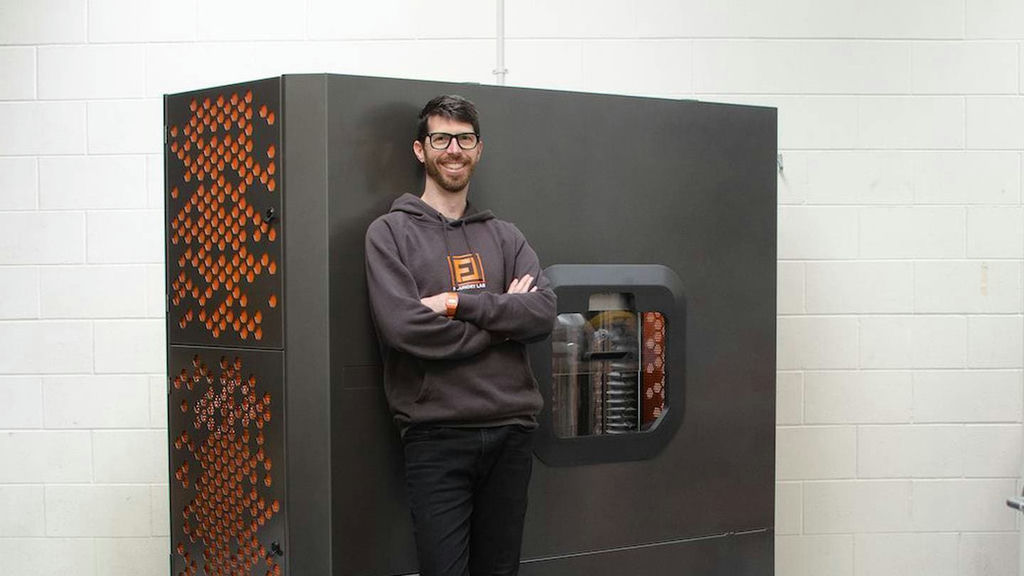Using a microwave, Foundry Lab has found a way to put lightning speed to work to drastically reduce the time it takes for the metal casting of real parts.
Foundry Lab will debut category-defining Digital Metal Casting technology at Formnext (Germany) in November, ahead of the opening of its first demo center in Fremont, California, early next year. Digital Metal Casting leapfrogs 3D metal printing to rapidly produce metal parts with the same physical properties as traditional cast metal. Slashing typical 1-6 week lead times for metal parts to just hours, the technology is set to completely revolutionize how the world’s largest manufacturers prototype production identical parts needed for innovation cycles and how quickly they can ramp production and produce parts.
Several of the world’s largest manufacturers are working with Foundry Lab to evaluate the system, including automotive and consumer electronics manufacturers and the startup expects Formnext to add to a growing pipeline of manufacturers that recognise the potential of Digital Metal Casting technology to transform their current manufacturing processes. Foundry Lab will enable them to produce metal parts on-demand, in-house at a fraction of the cost, time and climate impact of a traditional foundry.
The startup is backed by Rocket Lab founder Peter Beck, Motional chief executive Karl Iagnemma and former Autodesk chief executive Carl Bass as well as venture capital firms GD1, Blackbird, Founders Fund, Promus Ventures, WNT Ventures, Icehouse and K1W1.
A catalyst for change
“Today, car companies typically spend upwards of $200k per die-casting on prototype tooling, involving huge, expensive metal molds. What’s more, these usually take anything from three months to a year to produce. Our Fremont demo center will be positioned in the epicenter of car manufacture and plans to completely rewrite the manufacturing narrative. With Foundry Lab, none of this is necessary. Digital Metal Casting enables these companies to go from CAD design to producing real parts in the same-day using safe, compact microwave technology.” explains David Moodie, Founder and CEO of Foundry Lab.
Combining the speed and freedom of 3D printing with the economy and strength of metal casting, Foundry Lab’s system produces ‘production identical’ metal parts that can be crash tested for functionality; because they perform in exactly the same way as a production casting.
How it works
The proprietary technology solves for speed and quality with a solution that isn’t simply a ‘work around’. While 3D metal printing produces ‘look-alike’ parts it can’t replace a real casting. The Foundry Lab system produces a hands-free metal casting equivalent – without the need to pour molten metal.
The Digital Metal Casting process starts by 3D printing high temperature ceramic molds which are filled with metal feedstock and then heated via microwave to melt and cast the form. This casting process takes as little as 20 minutes. It’s easy to integrate into development workflows – requiring no special design requirements – and offers the ability to easily switch between metal types. Molds are automatically generated from CAD files and the microwave-powered compact foundries are safe and easy to use, reducing both climate impact and worker health risks.
Forging a pathway for industry-wide transformation
“Global companies have recognize the technology’s ability to forge a pathway for industry-wide transformation and accelerate the future of manufacturing,” believes Vignesh Kumar, Co-Managing Partner for GD1 who invested in Foundry Lab’s recent Series A raise, currently sitting at US$8 million dollars.
Scaling for growth
Over the coming year, the Foundry Lab team will triple to include microwave engineers, mechatronic and mechanical engineers and CAD operators as the startup builds towards commercial launch of its foundries in 2023. If you’re interested in joining the team, visit foundry-lab.com.


